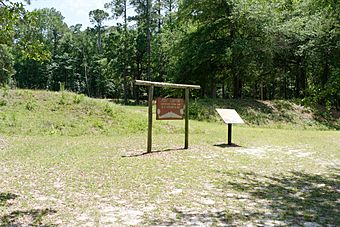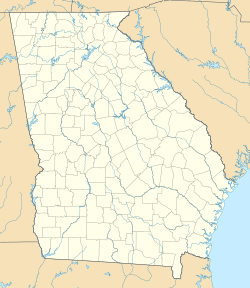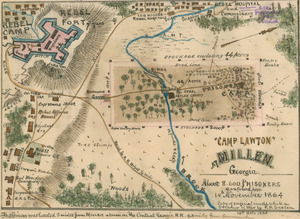Camp Lawton (Georgia) facts for kids
Quick facts for kids |
|
|
Camp Lawton
|
|

Earthenworks
|
|
| Nearest city | Millen, Georgia |
|---|---|
| Area | 101 acres (41 ha) |
| Built | 1864 |
| Architect | Brig. Gen. John H. Winder, C.S.A. |
| NRHP reference No. | 78000992 |
| Added to NRHP | March 24, 1978 |
Camp Lawton, also known as the Millen Prison, was a large stockade built during the American Civil War. It was used to hold Union soldiers who had been captured as prisoners of war. The camp opened in October 1864 near Millen, Georgia, in Jenkins County.
However, it had to be emptied very quickly, within just six weeks. This was because General Sherman's army was moving through Georgia. Camp Lawton covered about 42 acres. It held over 10,000 prisoners, even though it was planned for 40,000. At the time, it was considered the largest prison in the world.
Today, the area where the prison stood is part of Magnolia Springs State Park. You can still see parts of the earthen fort that protected the camp. Some large pieces of wood were found there. They might be from the prison or from work done by the Civilian Conservation Corps in the late 1930s.
The park's History Center now shows some of the first items found by archaeologists. These experts from Georgia Southern University have been studying the park for years. They help uncover and explain the history of Camp Lawton.
History of Camp Lawton
Camp Lawton was built by the Confederate Army in the fall of 1864. Its purpose was to hold Union prisoners during the Civil War. The location at Magnolia Springs was chosen because it had plenty of water.
The prison walls were made from pine trees cut right at the site. They were built by enslaved people and some Union prisoners. The walls were very tall, about 12 to 15 feet high. The camp started receiving prisoners in early October. At least 10,299 soldiers were held there.
However, the camp was abandoned by the end of November. This happened because General Sherman's army was marching towards Savannah. The Confederates had to leave the camp to avoid the advancing Union forces.
Finding the Prison Site
In December 2009, scientists used a special tool called ground-penetrating radar (GPR). This tool helps them see things underground. They used it to find a possible spot for the prison's southwest corner.
In 2010, Georgia Southern University started digging to check these findings. In August of that year, archaeology students found the actual prison walls. They also uncovered about 200 items from the Civil War. The students used old drawings made by a prisoner to help them find the exact location. A fence has been put up to protect the dig site near the park's aquarium.
Images for kids
 | Ernest Everett Just |
 | Mary Jackson |
 | Emmett Chappelle |
 | Marie Maynard Daly |





